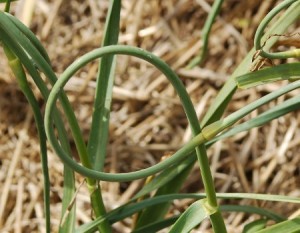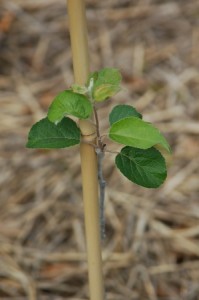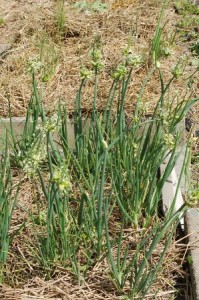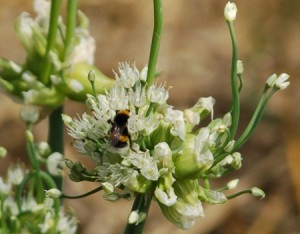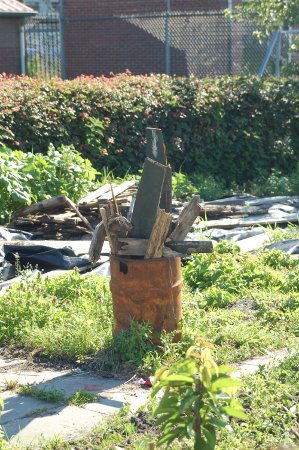
I’ve tried a few times in the past to make posts explaining life as an American living in Holland, and it’s hard to do. Anyway, the story of how this burn barrel came to be in the plot next to mine at my community garden is in many ways a good metaphor for so many things here, so I thought I would take another stab at it.
This plot was just assigned a new gardener. It’s a very isolated spot and positioned in a way that I’m pretty much his only neighbor. The new gardener, as well as not having any gardening experience, clearly has some developmental issues. He introduced me to his son, and told me he was ADD (Attention Deficit Disorder), but clearly this runs in the family and the father has some of the same problems. The management of the community garden didn’t discuss the situation with me first at all (which is okay, they didn’t need my permission), then just dumped him in his plot with almost no support or supervision.
He’s a nice guy, I like him, but communication is very difficult and compounded by the fact we don’t have the same native language. Explaining anything takes a lot of time and patience. He’s very keen to get both plants and experience from me, and I’m sure many readers of this blog will understand this is something I’m willing to invest a lot of effort and time into.
Compost
I told you this was from a gardening perspective, so first a little background.
Probably most people reading this will find it hard to believe, but 95% of Dutch gardeners don’t use compost. For them, compost is waste and not desirable for the garden. Most gardeners in my community garden dig a deep hole at the end of the year and bury any accumulated compost and garden waste as deeply as possible where it’s safe. We all have compost piles and make it, and many gardeners somehow feel like they are doing something valuable for the environment in this way, but then they throw it away or bury it.
Probably the idea that compost is bad comes mostly from commercial farmers, whose crops are specially bred to be uniform and grow well in poor ground with chemical fertilizer added.
According to these gardeners compost makes weeds. To their credit, there is some truth to this. It’s true, if you have a piece of neglected ground in our climate, then put a layer of compost on top, you end up with a fiercely growing patch of stinging nettles and thistles. For the Dutch, this is proof, and there is simply no further discussion. If you think I’m being dismissive or sarcastic, I truly invite any of my readers to come here and try to convince them there is some value in compost. It’s just not possible. I am very serious!
Our community garden association often has discussions concerning the possible contamination of the ground water from compost use, and many gardeners are very passionate about this. Sometimes these discussions become very heated. I consider it a small victory I’m allowed to use compost at all, as in some places the harassment would be so great I might have to stop.
Instead of compost, Dutch gardeners use chemical fertilizer, which does in fact give fewer weed problems in the short term. As organic gardening has been a recent trend here like many other places, gardeners tend to interpret this to mean they need to buy boxes of fertilizer labelled organic together with organic seeds, but still not use compost.
You might think this would be a great opportunity. I could go around and collect as much compost as I want from others who don’t want it. Ah, the Dutch are too clever for this. There is a complex set of things going on here, and with everyone it’s a little different, but here are a couple of the important ones.
First is they are aware some people put value on compost, so they feel they should be able to sell it. They also know foreigners come to their country and sometimes make them look foolish by doing things better. It’s very hard for many people to understand that I would be happy to take their compost if they don’t want it and save them the trouble of throwing it away, but I’m not going to pay or trade for it because I have compost of my own. It must be worth money, or it must be trash, and if they give it away it could make them look foolish.
So since compost is trash it must be treated like trash. It’s not possible to ask them not to throw pieces of plastic, metal, even glass into their compost. For a time there were compost collection bins around the country, so people could compost their kitchen waste. I haven’t seen any in years, and I think part of the reason was that there was a mad rush of people trying to help the environment by adding all of their household trash.
In terms of the very underlying problems here, the Netherlands is a small country, and like any small town or community it has a narrowness in thinking. I’m not saying there’s anything wrong with that, but it is the case. There have also been long running problems with the education system here, which started with very deep budgets cuts in the 1980s that were never restored. Primary education has always been good, and many skills like languages, business, civil and water engineering, architecture and others are widespread and extremely competitive. With many exceptions, most Dutch people however lack basic reasoning skills or breadth in their higher education, and rather have blue collar vocational oriented training.
Fires in Gardens
Okay, back to the burn barrel.
Officially, the rule is we are allowed to burn garden waste within reason. We are also allowed to have barbecues or burn firewood. No fires are allowed on the ground, but rather have to be in a container. We are not allowed to burn trash.
The problem of course is many, if not most Dutch people don’t understand the difference between garden waste and trash. It’s the same problem with compost and trash. Since it’s not possible to have a rule that non-Dutch people can have fires and Dutch people can’t, the operating principle is no fires are allowed.
Many non-Dutch people find the total prohibition too restrictive, and sometimes burn wood from their trees or have barbecues. Dutch people often have barbecues. This is justified by what the Dutch call ‘tolerance’. In other words, even though these fires are permitted, the operating principle is that fires are not allowed, but the garden management tolerates them. Got that?
My Garden Neighbor
Okay, back to my new neighbor.
The member of the garden management who is in charge of assigning gardens, and decided to assign the plot next to mine, is called the ‘Garden Commissioner’ (GC for short). As well as assigning the plot, he helped the gardener get started by assisting with the instruction that all compost should be removed and the garden should be doused with chemical fertilizer. The new gardener was then encouraged to get further assistance and plants from me.
Like all newly assigned plots in our garden, this one came with a big pile of trash. Even though our gardens are across the street from the city dump, this gardener complained it would be too much work to bring it there. This is a little understandable, as it was a pretty big pile and it would have been a lot of work. The GC had the perfect solution, he gave the new gardener the burn barrel and instructed him to burn the waste. He also told him ashes were good for plants, so he should spread them around his garden. For the GC this was justified by the same tolerance that allows some people to use a barbecue in their garden.
I immediately started explaining to the gardener that burning trash was not allowed, and the only thing he could burn was clean, unpainted and untreated wood. He was very adamant that he not only had permission but instructions from the GC, and he had no other good way to take care of the trash. He did however agree, he would only burn clean wood.
A few days later Steph and I went to the garden, and a horrible smell was coming from the burn barrel next door and the other gardener was on his way out while we came in. The smell lingered for days in the garden and our clothes. I had a look in the barrel, and discovered a piece of burned PVC coated fence. When PVC is burned, it’s very toxic and who knows what else he was burning! His garden was full of plastic, painted wood and all sorts of other things that should not be burned.
I saw the gardener the following day, explained he was creating a very serious situation and he must really stop burning trash. He agreed, and promised only to burn clean wood, but it was clear he could not tell the difference between clean wood and trash, and was not able to resolve the conflicting instructions of the GC and myself. The next time I was at the garden I found the burn barrel as in the picture above ready for another round of burning full of painted wood and other things.
A Letter
In theory the next step was to take this up with the GC, but the situation was too urgent and something needed to be done very quickly. I also felt I wouldn’t get anywhere discussing the difference between trash and clean wood with the GC, as I already had experience with that.
Instead I made a written complaint in a way I knew would attract a lot of attention. It’s not only against the rules to burn trash, it’s illegal. This letter might possibly have been the first step in taking legal action against the garden if it didn’t stop, in order to protect my own garden, and they had to do something.
The reaction was very clear. An inspector of some sort visited the garden, interviewed the gardener and took samples for testing. No one has said anything to me, but the garden now seems abandoned, I guess pending determination of contamination then possible decontamination. The city takes this kind of thing very seriously in gardens where people grow food, as they should.
Who’s Fault?
Well mine of course. The GC made a decision the trash would be taken care of by burning and, with one letter and in a brief instant, I undermined that decision and made him look foolish. The new gardener is now without a garden. I’m sure as far as the GC is concerned I’ve invoked some worthless bureaucracy in his government he doesn’t understand, and he’s of an age where I’m sure he grew up with burning trash in a barrel being a normal thing. It was certainly a normal part of my childhood.
It’s clear the GC is very angry at me. He often speaks of the problems foreigners cause in this country, and I’m sure this is just one more example. I doubt he will ever get over this, and it’ll continue to be a reason to show hostility towards and distrust me.
The new gardener doesn’t seem mad at me, and does seem to understand something serious happened, but really doesn’t know what. Now when he’s allowed to use his garden again, he will return to a garden without any compost, full of chemical fertilizer, and count on me to explain why things aren’t growing well and tell him what he should do next.
Elections
So I said before that this is a good metaphor for what’s going on in this country.
We just had national elections.
The Dutch government is made up of a number of political parties, and there is almost always a coalition formed after elections. There are two main parties, Labor (similar to the US Democrats) and Christian Democrats (similar to the US Republicans), and usually one of these gains the most votes enabling them to nominate a Prime Minister.
In these past elections, neither one of these two main parties got the most votes. The votes were spread out among a lot of smaller parties, mostly with extreme views. Roughly 50% went to right wing parties, that mostly campaigned on a anti-foreigner platform. Roughly the other 50% went to left wing parties. There are enough ideological differences between the parties anyway, that for many of them it’s very difficult to work together under the best of circumstances, but it’s hard to imagine what kind of government will come out of coalition talks this time. Normally a coalition is formed from two and occasionally three parties. This time a minimum of four parties will be necessary, and five or more would not be out of the question.
Foreigners are blamed for importing their own culture and ignoring Dutch culture, taking jobs from Dutch people and in general undermining the authority of Dutch people by ‘working around the system.’
What ever happens with this next government, it won’t be anti-immigrant. There is huge need for knowledge workers here, and not only are these work permits available, they are actively being promoted by the government. Knowledge workers who come here get tax breaks and many forms of special treatment. While I think we can now request it, until now the Dutch government has ignored an EU directive requiring them to issue work and residence permits validated for the whole of the EU to those who currently have them for the Netherlands, because they’re afraid these people will leave the country.
The number of Dutch people leaving the country recently reached an all time high, and it’s primarily the educated who are leaving. On the other hand increasing numbers of unskilled workers are coming in primarily from eastern Europe. It’s really a rapidly escalating problem.
In short, this country needs people who understand what compost is, but is willing to be supervised by someone who thinks it’s toxic waste and hates foreigners. They will be required to teach organic gardening on a plot of land with chemical fertilizer and without compost. They need to live in a country where the government was elected promising to get rid of them, and many people resent they are there. There are many tax benefits and other perks available. Volunteers?



